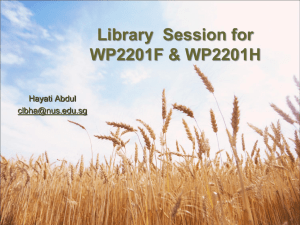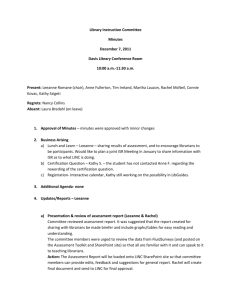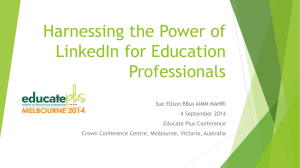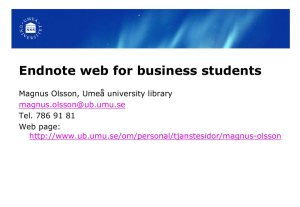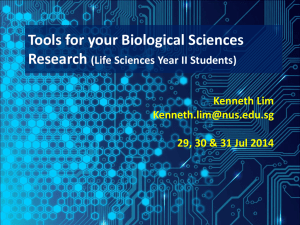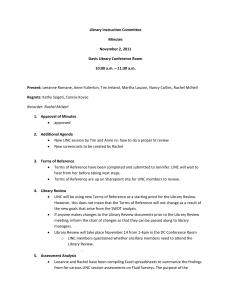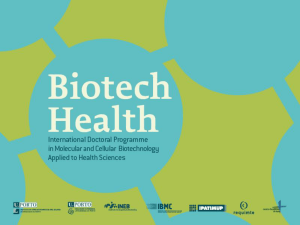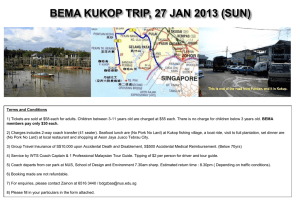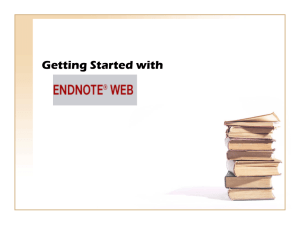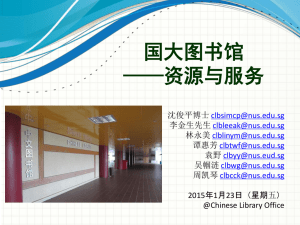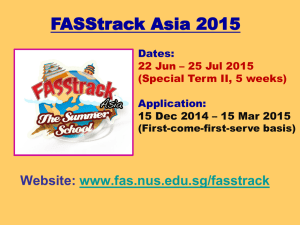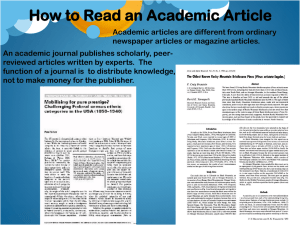Tutorial PPT - NUS Libraries
advertisement
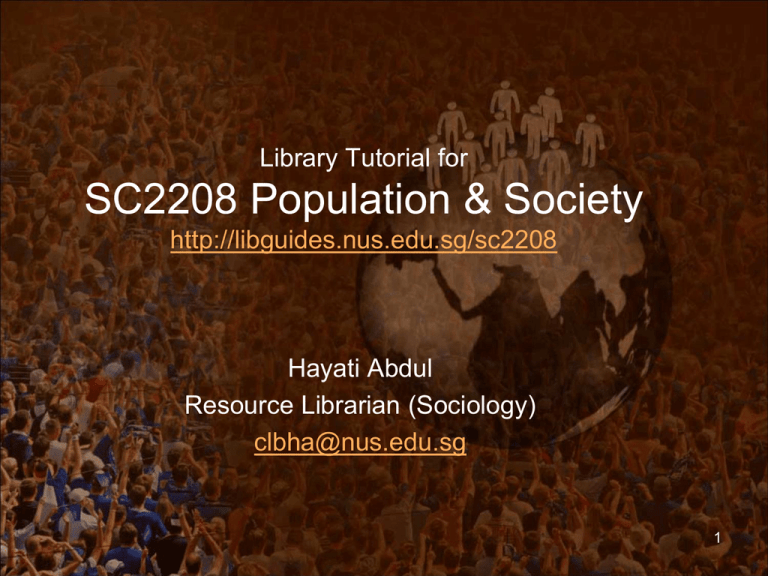
Library Tutorial for SC2208 Population & Society http://libguides.nus.edu.sg/sc2208 Hayati Abdul Resource Librarian (Sociology) clbha@nus.edu.sg 1 SC2208 Library guide & Tutorial PPT in IVLE 2 What You’ll Learn Understand the research process Find citations & full-text articles Use advanced searching techniques Search subscribed databases Evaluate information sources. 3 Get Started 4 Exploring a Topic Choose a topic that interest you personally Get ideas from scanning books, encyclopedias, journal or newspaper articles Ensure that your topic has sufficient resources Avoid topics that are too broad or too narrow. 5 The Research Process List synonyms, related words & variant spellings Create search statement Identify main keywords Explore Search for sources using LINC+/LINC & databases Topic Complete your assignment Get more sources by checking references no yes Are there enough? Evaluate quality, currency, relevance, etc. 6 Information Sources Source Useful for How to Access Books Overview of topics LINC+, LINC In-depth treatment of topics, usually current and scholarly. Some journals may be peerreviewed Citations: databases Full-text: LINC+, LINC Recent events, anecdotes, book reviews, interviews, biographical information, “data” Factiva, LexisNexis, microfilms Journal articles Newspapers Theses & dissertations Websites (.edu, .gov, .org ) Students’ exploration of topics Exploring the topic LINC+, LINC, Proquest Dissertations & Theses Search engines 7 Evaluating Information Sources Authority: reputable publisher, society or organisation; author’s credentials & institutional affiliation Accuracy: methods of research; means to verify data; support by references Objectivity: biasness Currency: up-to-date Scholarly: peer reviewed, cited More info at: http://owl.english.purdue.edu/owl/resource/553/03/ http://www.usg.edu/galileo/skills/unit09/ 8 Scholarly & Peer-Reviewed Journals Scholarly journals contain articles written by and for experts in a discipline Many scholarly journals use a peer review process before publishing an article Note: not all scholarly journals go through the peer-review process, but a peer-reviewed journal can be assumed to be scholarly. 9 The Peer-Review Process S=scientist E=editor R=reviewer 10 Create Search Statement 11 2.Think of synonyms, alternative terms You have a topic and Babies - childbearing, fertility, want to find books and birth rate journal articles. Singapore - Singapore 1. Identify keywords/concepts that describe your research topic: Why aren’t Singaporeans having babies? 12 More about Keywords Keywords are distinctive words and phrases that you type into the search boxes of search engines. Choose only the most important word(s) from your topic. Phrase searching narrows your search. Databases cannot process words like article, pronouns, prepositions, etc. Omit them as sheer frequency of these words can derail search. Can also use formal vocabulary for appropriate keywords e.g. subject headings or thesaurus terms. 13 3. Combine keywords/concepts using Boolean connectors 5.Create a search statement searching AND = both terms must be present all concepts & combining them with more → to refine search than one Boolean operator: A → fewer results (childbearing OR fertility OR birthNrate) childbearing singapore AND Singapore D 4. Group words to be searched together with round parentheses ( ) OR = either terms may be present (childbearing OR fertility OR birth rate) → to broaden search → more results fertility childbearing OR NOT = excludes a search term → use with caution 14 Wildcard (?) & Truncation ( * ) Used to search terms that have variant endings or spellings. E.g. Health care financing for the ageing population Search statement: health care AND financ* AND ag?ing AND population financ* will find the terms finance, financial, financially ag?ing will find the terms ageing, aging 15 Databases 16 Finding Articles: Search Databases Method 1: Browse databases by subject Method 2: Select a major database listed here Method 3: Search by name of database e.g. Sociological Abstracts Note: Most databases do not provide full-text articles 17 Multidisciplinary Databases Scopus Multidisciplinary Indexing database (no full text) Usually offers links to full text Good design, useful tools and easy to use 18 Let’s search Topic Why aren’t Singaporeans having babies? Identify Keywords #1: childbearing, fertility, birth rate #2: Singapore 19 Let’s search Enter search terms Click to add additional search boxes May limit search by Date, Document type, Subject Areas 20 Search Results Sort results by relevance View fulltext via publisher site Click to view abstract View abstract via CSA databases Toggle to LINC to access source title 21 Output Search Results Export selected records to EndNote Create QuickBib Mark records 22 Output selected Results Export selected records to EndNote Alternatively, create QuickBib Select EndNote 23 Create Bibliography (Scopus QuickBib) 24 Introduction to EndNote 25 Citations and Bibliography Two places to cite the references you have used: within a sentence (in-text citation) at the end of the document (footnotes/bibliography/references) In-text Citation Herring and Paolillo (2006) found that the genre of a web entry—rather than the gender of the writer—affects the style of writing. Bibliography/Reference Herring, S. C., & J. C. Paolillo. (2006). “Gender and genre variation in weblogs”. Journal of Sociolinguistics 10(4): 439-459. 27 Workflow 1. Create an EndNote Library 2. Add references to the EndNote Library 3. Manage references: using groups & finding duplicates 4. Insert references in MS Word (Cite While You Write) 5. Change citation style and preferences 28 Hands-on Step 1: Create an EndNote Library a. b. c. d. All programs > EndNote > EndNote Program Select Create a new library Each library has: .enl Filename: sociology (*.enl) .Data Save Note: no limit to number of references, but <100,000 is recommended 30 Step 2: Add References to EndNote Library Direct Export Import Text File Online Search Manual Inputting Import PDF EndNote Library MS Word/Open Office Cite While You Write 31 EndNote Tutorials From 1st to 4th Mar 2011. Details available at http://libguides.nus.edu.sg/content.php?pid=96551&si d=723020 32 Let’s search these topics… 33 Let’s search Topic “Can't live with them, can't work without them”: foreign workers in 'global city' Singapore. Discuss. Identify Keywords #1: migrant workers foreign workers #2: singapore #3: ? 34 Let’s search “Migration has been responsible for the depopulation of rural areas and for the development of giant cities.” Comment. Topic Identify Keywords #1: #2: #3: ? 35 Let’s search… Topic Population aging has different health and social effects for males and females. Discuss some of these differences. Identify Keywords #1: #2: #3: 36 Let’s search… Topic “International migration should not be regulated by governments because it is an issue of survival.” Discuss. Identify Keywords #1: #2: #3: 37 Let’s search… Topic What happened to mortality rates and expectation of life at birth over the course of the demographic transition, and why? Identify Keywords #1: #2: #3: 38 Let’s search… Topic Because of China’s 1979 one-child policy and a cultural preference for boys, there is now a shortage of marriage-age girls. How is the Chinese government and Chinese families dealing with this? Identify Keywords #1: #2: #3: 39 Let’s search… Topic Discuss the statement: “High levels of social integration and social regulation reduces suicide.” Identify Keywords #1: #2: #3: 40 More Databases… Sociological Abstracts Coverage, 1979Culture, social structure, social differentiation, social psychology, sociology of the arts, business, education, studies in violence and power and more…… Note: Search LINC for full-texts 41 Access Sociological Abstracts from Portal 42 Access Sociological Abstracts 43 Let’s search Topic Why do you think more women and men are delaying marriage, or not marrying at all, in East Asian and Southeast Asian countries? Identify Keywords #1: #2: #3: ? 44 Let’s search May limit search terms to specific fields e.g. keywords Enter search terms in boxes Boolean operators Limit search by date range, journal articles, etc 45 Search Results Sort by relevance Output selected records Mark records Search for source title in LINC View full record & abstract 46 Output Selected Results Select format Create QuickBib Select specific style Save file to export to EndNote using Sociological Abstracts (CSA) filter 47 Locating full-text in LINC+ Let’s now output results in Sociological Abstracts Select to access e-version Select to view print volumes 48 Google Scholar 49 What about Google Scholar? Attempts to provide a single search engine for scholarly literature. Note: Not all results come from scholarly sources Good for quick research. May offer a number of versions of the same article depending on where it was found. Search results may include links to full-text articles freely available on the Internet. Many links take you to publishers' websites where access requires a subscriber login. 50 Proxy Bookmarklet To access Full-text Note: It works only for source titles subscribed by NUS Libraries 51 What does a Proxy Bookmarklet do? • Inserts the following NUS library proxy stem into the URL of an article: libproxy1.nus.edu.sg Your web browser contacts NUS proxy server Proxy server makes the "real" request from vendor NUS Library Proxy server You want article X You get article X Vendor Vendor recognises NUS proxy & responds 52 Install Library Proxy Bookmarklet to access full-text Cite References 54 Why Cite? Provides evidence for your arguments and adds credibility to your work. To help readers find your sources & go through some of the steps you took to reach your conclusions. To show your teachers the work that you have done Helps avoid charges of plagiarism. 55 The kinds of sources you need to cite… Direct quotations from a book, article, letter, email, lecture, etc. Single words, short phrases, sentences & passages quoted from books or articles used. Statistics, illustrations, charts… Ideas you draw from a source but present entirely in your own words. Paraphrases and summaries of books, journal articles, pamphlets 56 ASA (American Sociological Association) Citation Style Journal Article (Single author) If author’s name is in the text: In text … in another study by Chuan (2010) Reference list Chuan, K. E. 2010. "Will Singapore's fertility rise in the near future? a cohort analysis of fertility." Asian Population Studies 6:69-82. 57 ASA Citation Style Journal Article (Multiple Authors) In text Reference list If authors’ names are not in the text: (Frejka, Jones, and Sardon 2010) Frejka, T., G. W. Jones, and J. P. Sardon. 2010. "East Asian childbearing patterns and policy developments." Population and Development Review 36:579-606. Retrieved December 12, 2010 (http://onlinelibrary.wiley.com.libproxy1.nu s.edu.sg/doi/10.1111/j.17284457.2010.00347.x/pdf) 58 ASA Citation Style Book (Single Author) In text (Newbold, 2002) Reference list Newbold, KB. 2002. Six billion plus: population issues in the twenty-first century: Rowman & Littlefield Pub Inc. 59 ASA Citation Style Book (Edited) Authors cited for the first time: In text Jatrana, Toyota and Yeoh (2005) Authors cited subsequently: Jatrana et al. (2005) Reference list Jatrana, S, M Toyota, and BSA Yeoh, eds. 2005. "Migration and health in Asia." New York: Routledge. 60 ASA Citation Style Book chapter In text (Leheny, 2006) Reference list Leheny, D. 2006. "A narrow place to cross swords: 'soft power' and the politics of Japanese popular culture in East Asia " Pp. 211-233 in Beyond Japan : the dynamics of East Asian regionalism edited by P. J. Katzenstein and T. Shiraishi. Ithaca, N.Y.: Cornell University Press. 61 ASA Citation Style Website In text Media Development Authority (2006) Reference list Media Development Authority. 2010. “Media classification: video games.” Singapore: Media Development Authority. Retrieved August 16, 2010 (http://mda.gov.sg/Public/MediaClassific ation/Pages/VideoGames.aspx). 62 Search the Catalogue 63 Finding Full-text: Search LINC or LINC+ LINC LINC+ Search one field (title, author, keyword, call no., ISBN) and location/collection Good for known item search (e.g. journal titles) Search many fields (title, author, keyword, subject) Good for browsing & discovery 64 Finding Full-text: Journal Record in LINC+ E-journal publishers/providers Our subscription Latest vol, issue Click for complete listing of volumes in Bound Journals 65 and Closed Stacks Tips 66 Troubleshooting Search Results You may encounter: too many results use AND, phrase search “ ”, more specific keywords, limit results by date, document type, etc. too few results use OR, asterisk *, more general keywords, synonyms/related words many irrelevant results exclude keywords that are too general no results check spelling, use more OR & synonyms, or redefine your research topic If you need help, check with your professor or ask a librarian! 67 Let’s Recap… Use synonyms and related words Create search statement using keywords plus AND, OR, NOT, ( ), *, “ ” Select fields e.g. article title, abstract Limit/refine search by type (article, books, reviews), date, peer-reviewed, etc Sort results by relevance Quality (Relevance) vs. Quantity 68 More 69 Appropriate Use Library resources are mainly for your research and study Use them responsibly Observe copyright guidelines for photocopying and printing - 10% or 1 chapter of book - 1 article in a journal issue Avoid excessive photocopying or downloading Copyright violations may have serious consequences 70 Getting Help Phone: 6516-2029/30 Email: clbha@nus.edu.sg askalib@nus.edu.sg (general queries) Walk in: information desk (CL, level 5) Others: FAQs Library Instruction ONline (LION) Subject Guide 72 Happy Searching! 73
